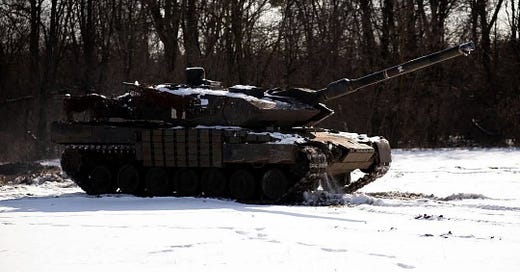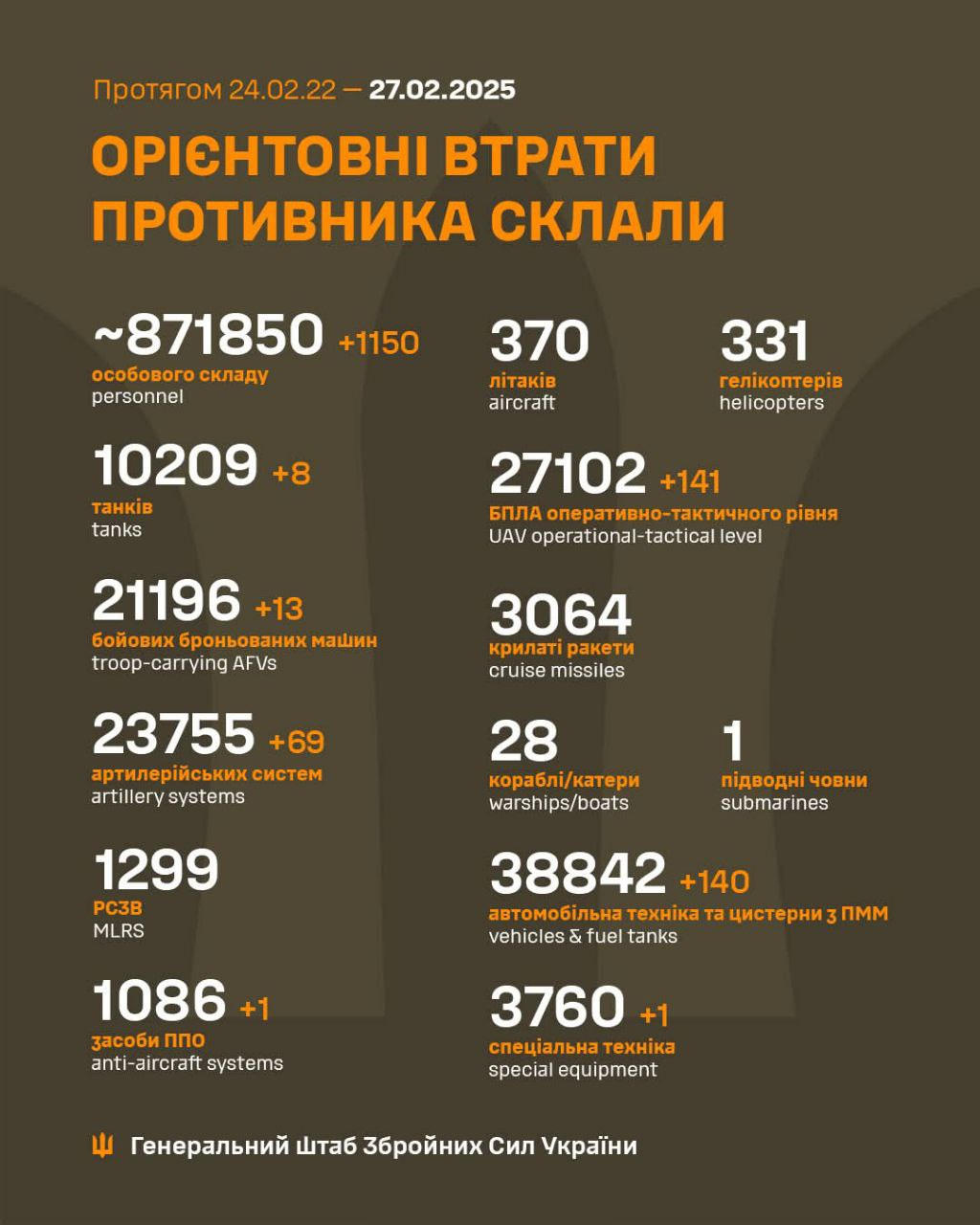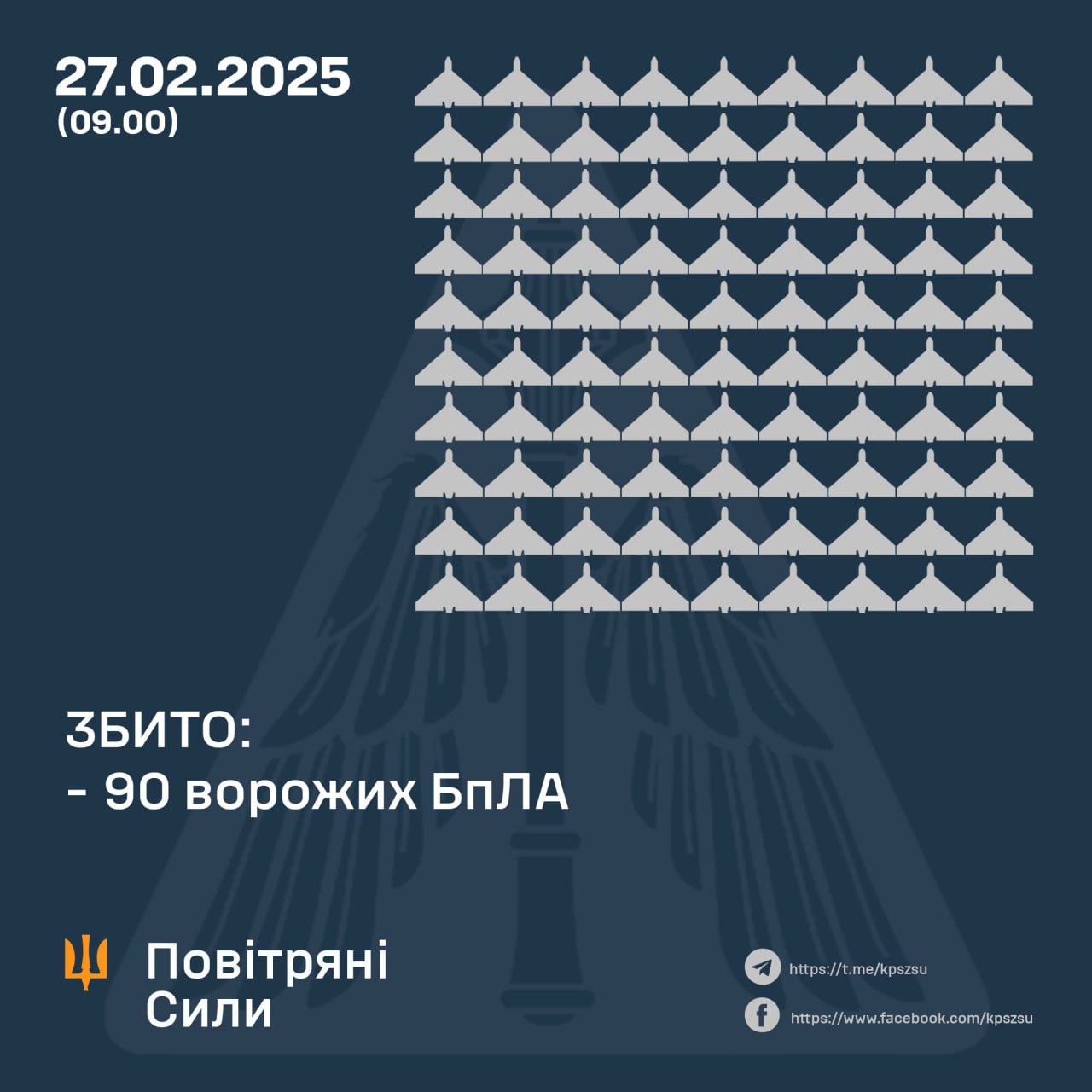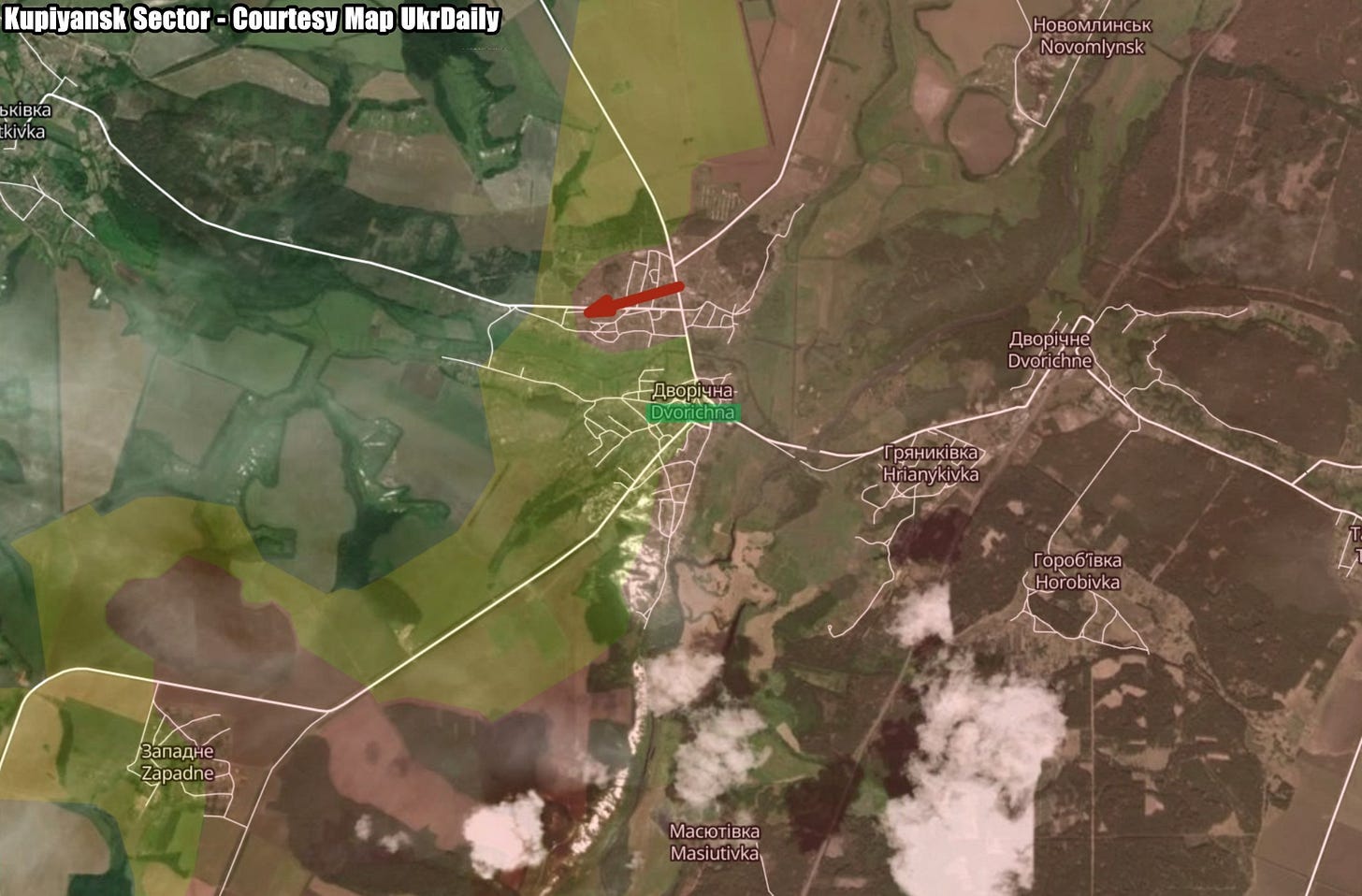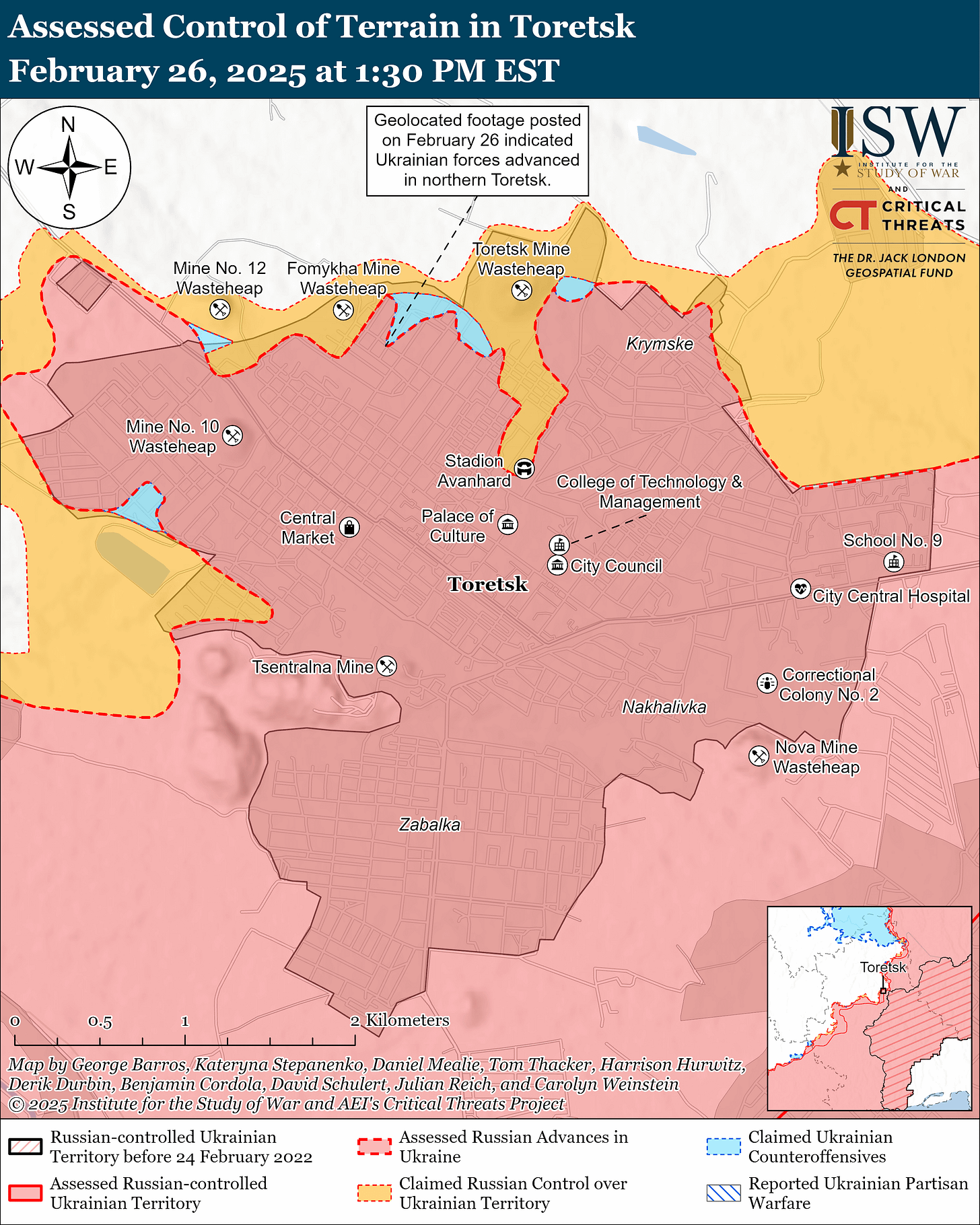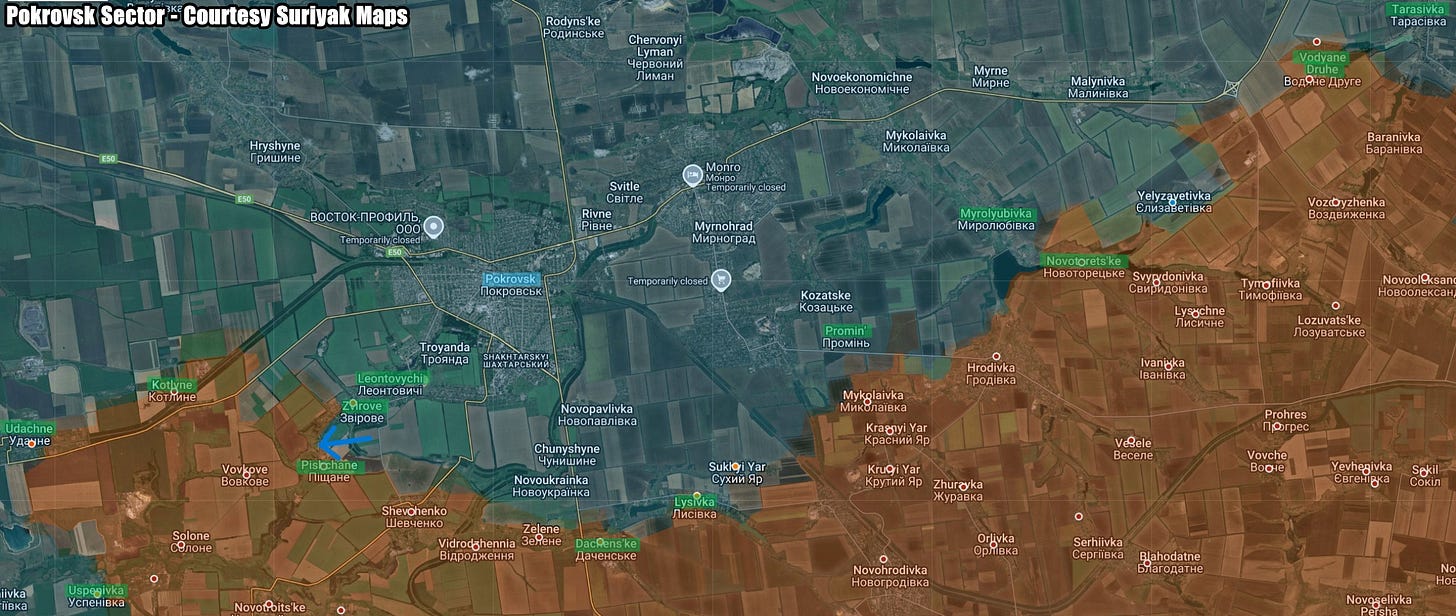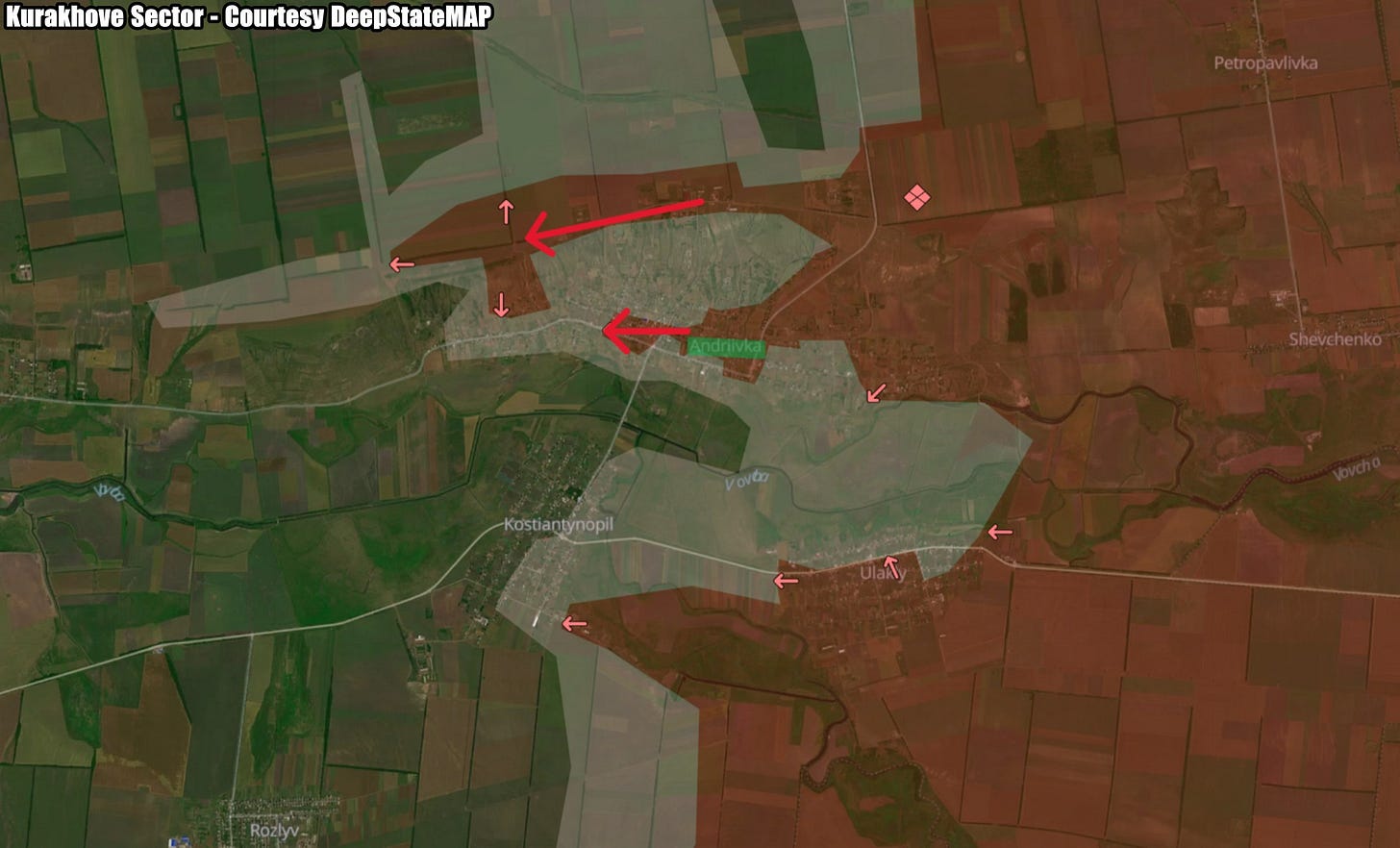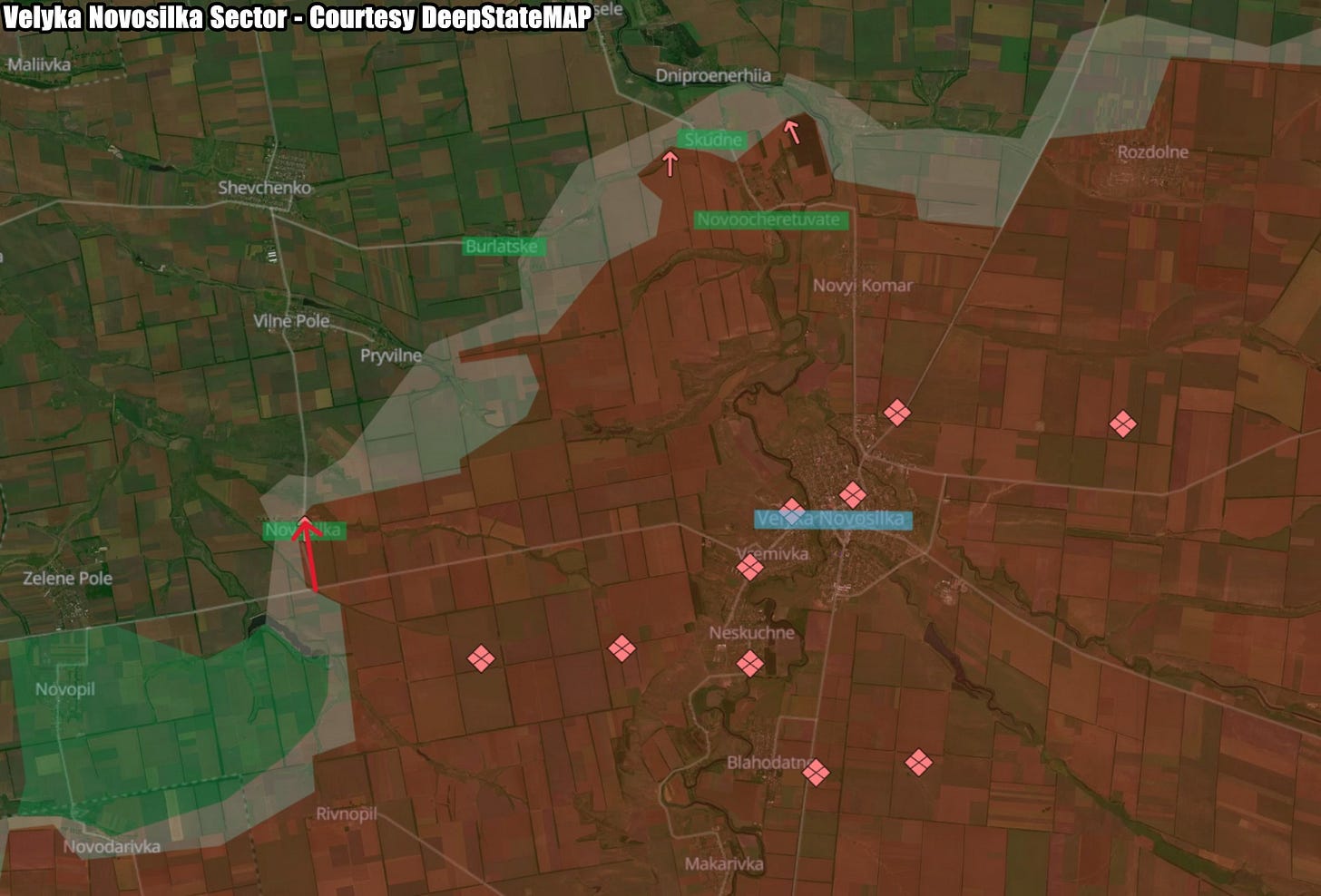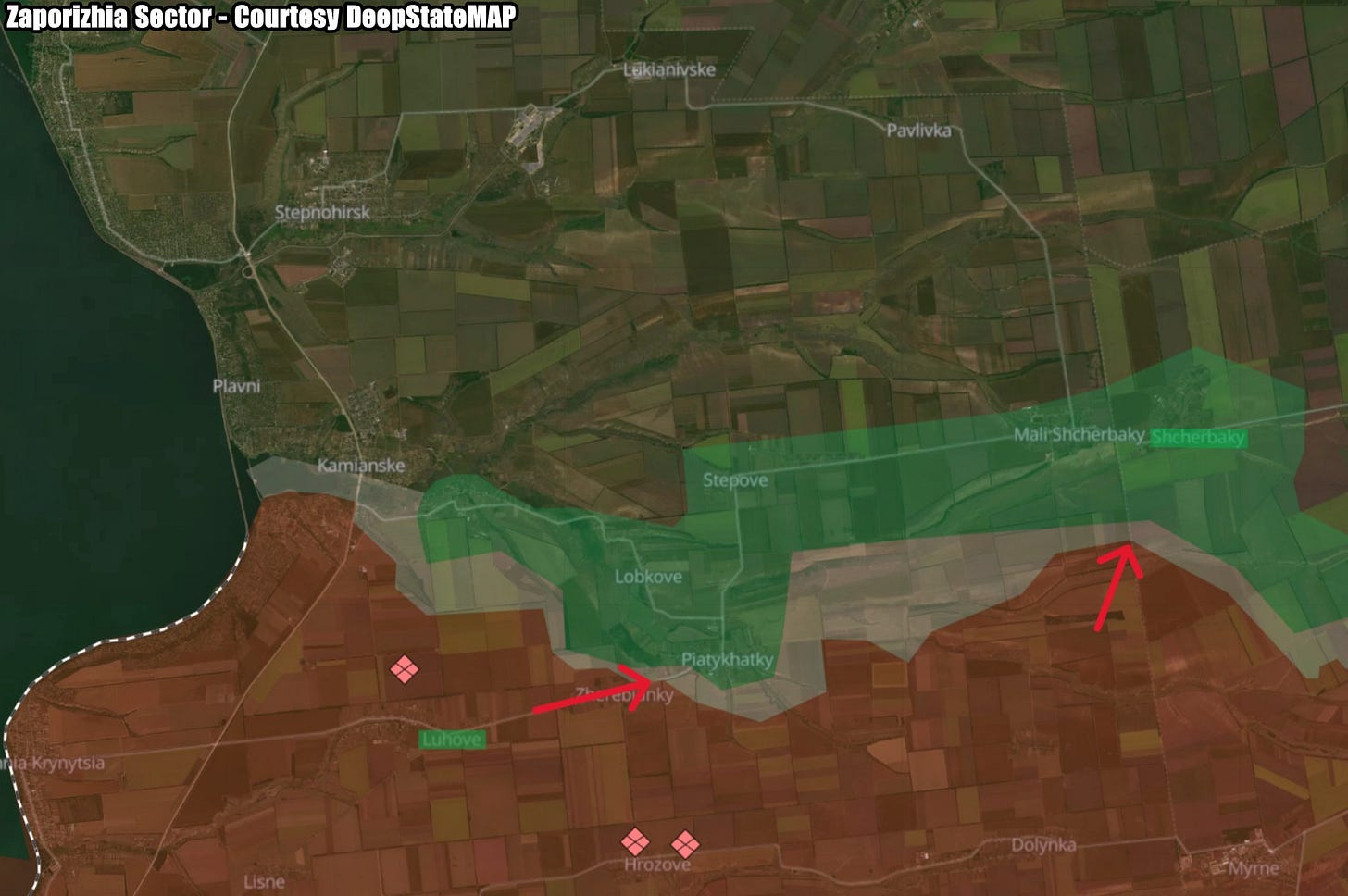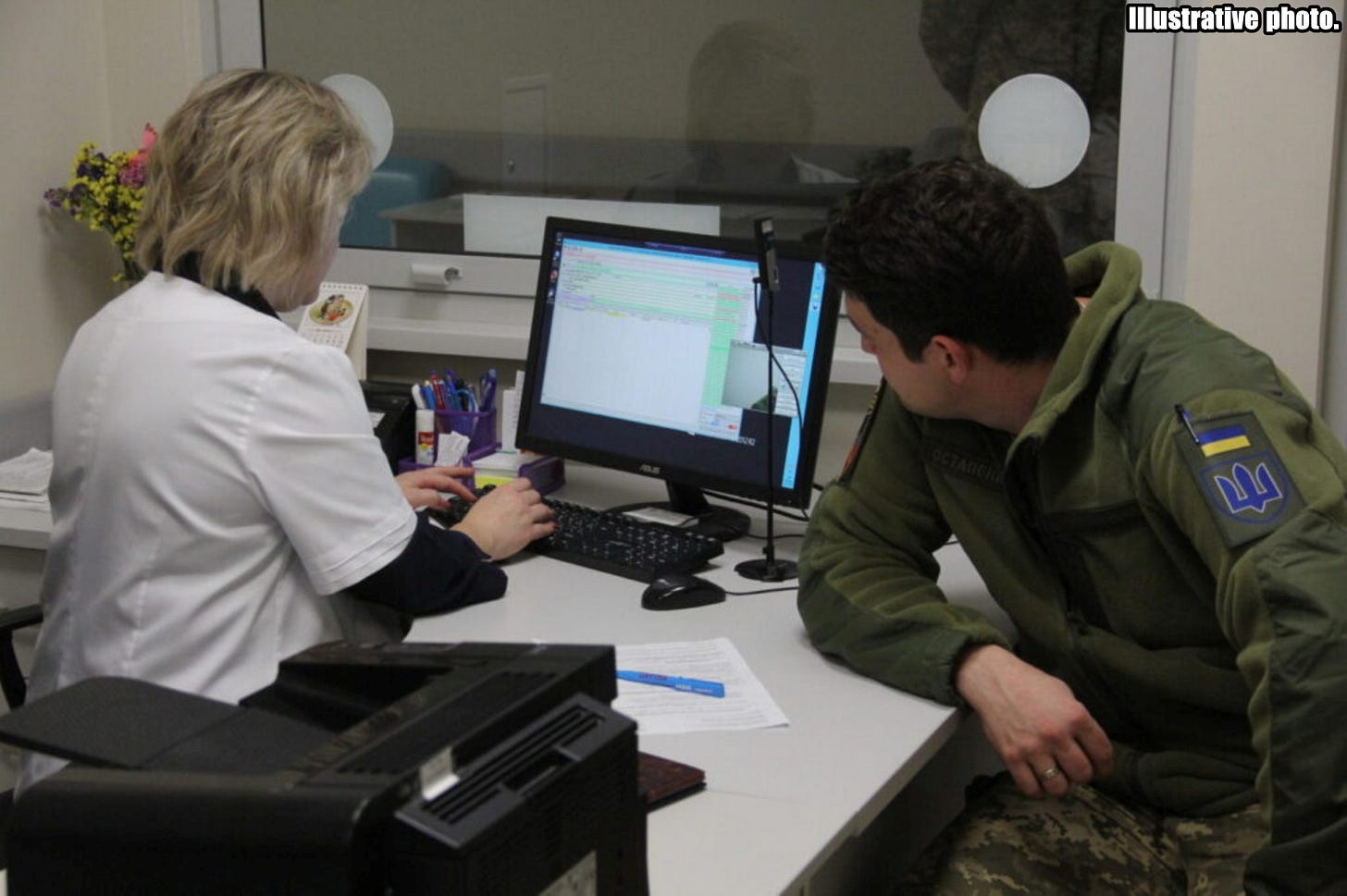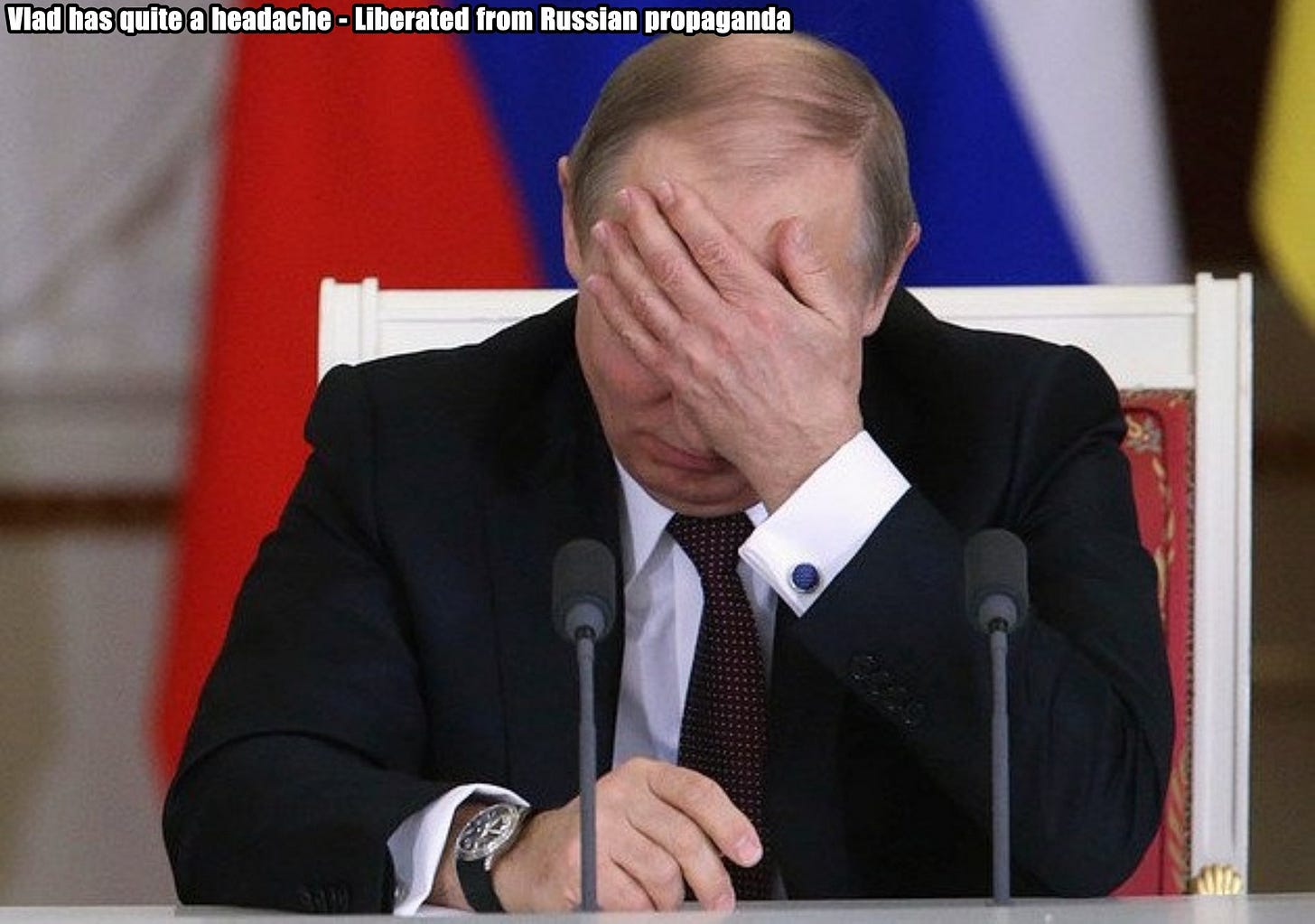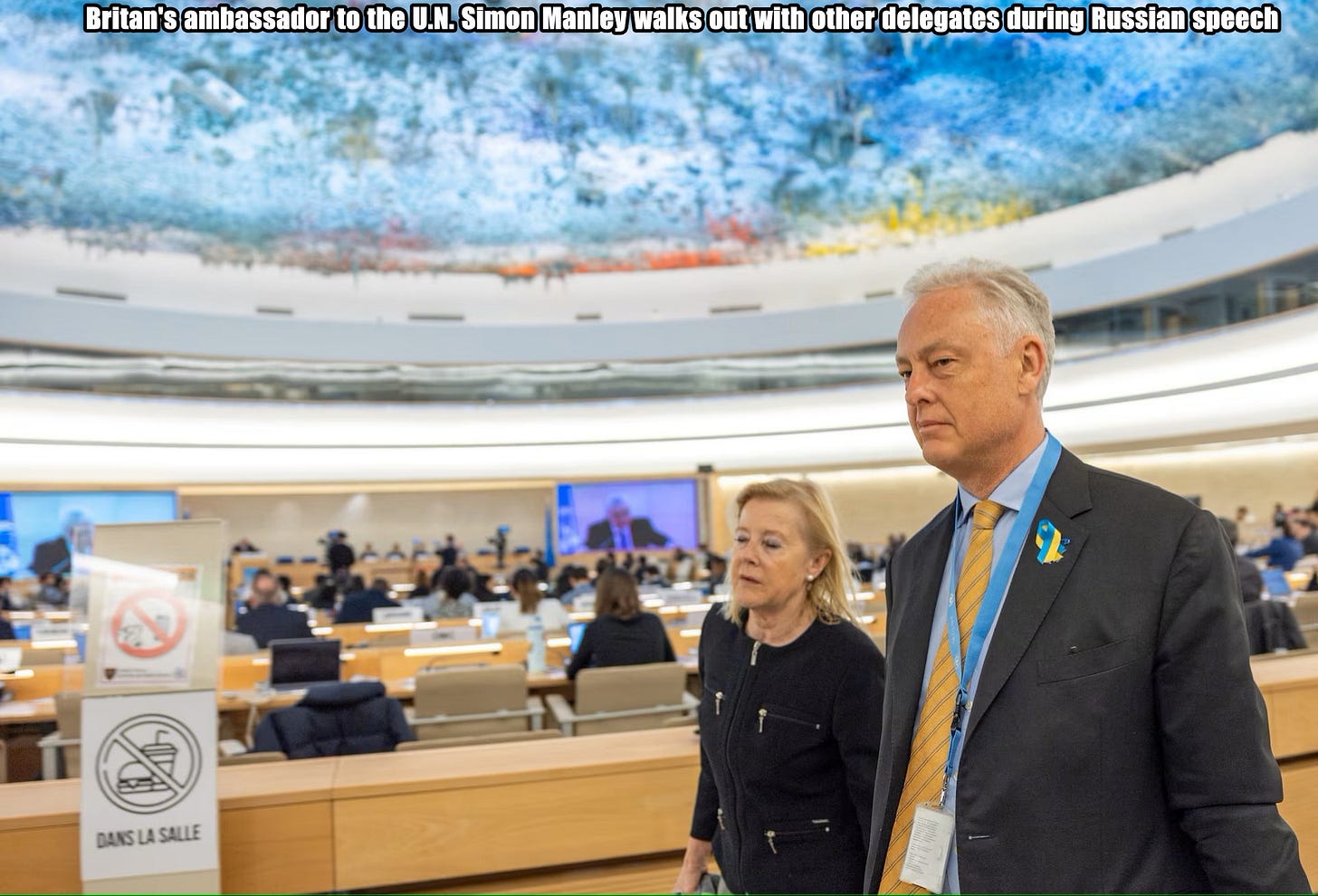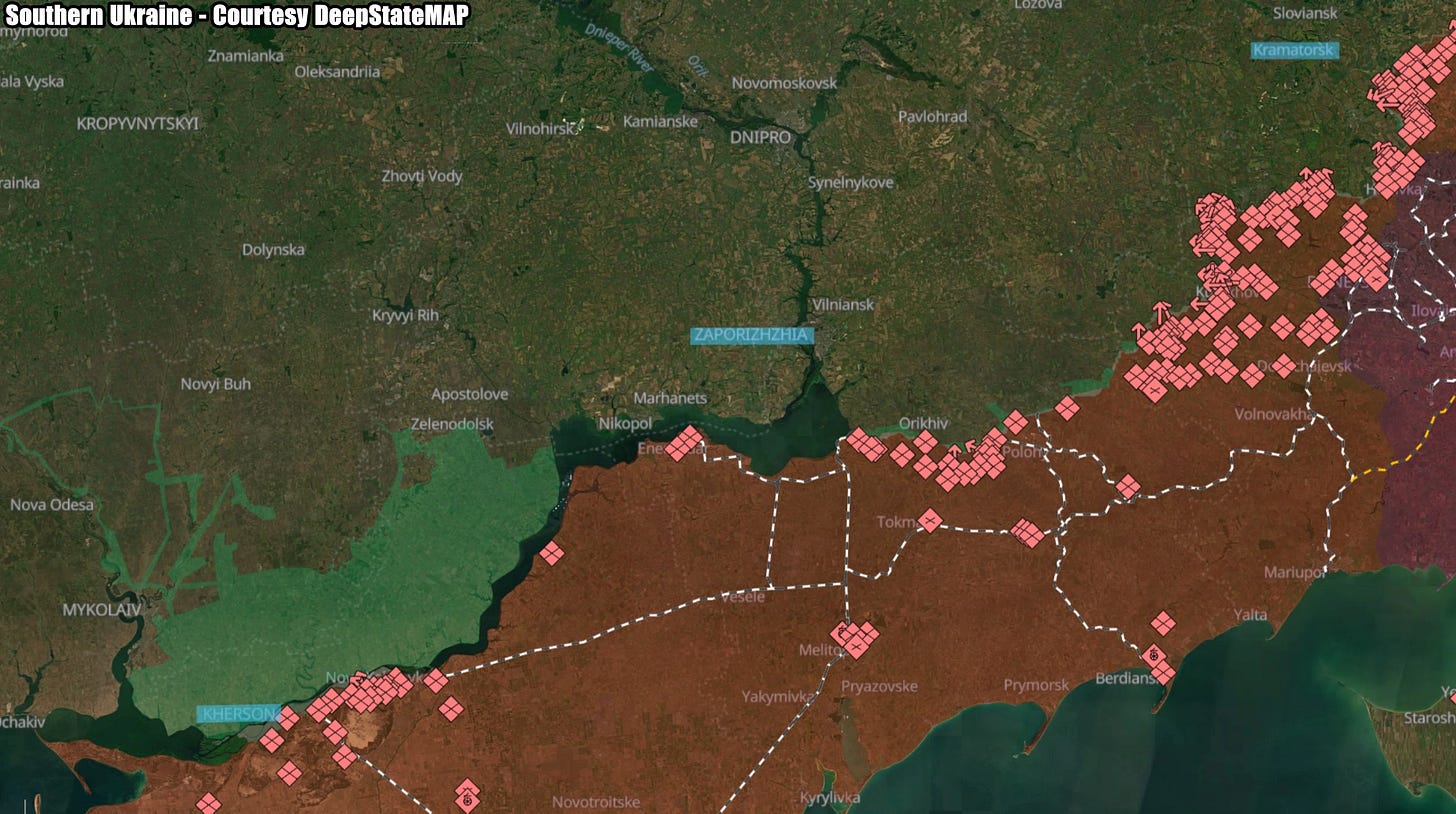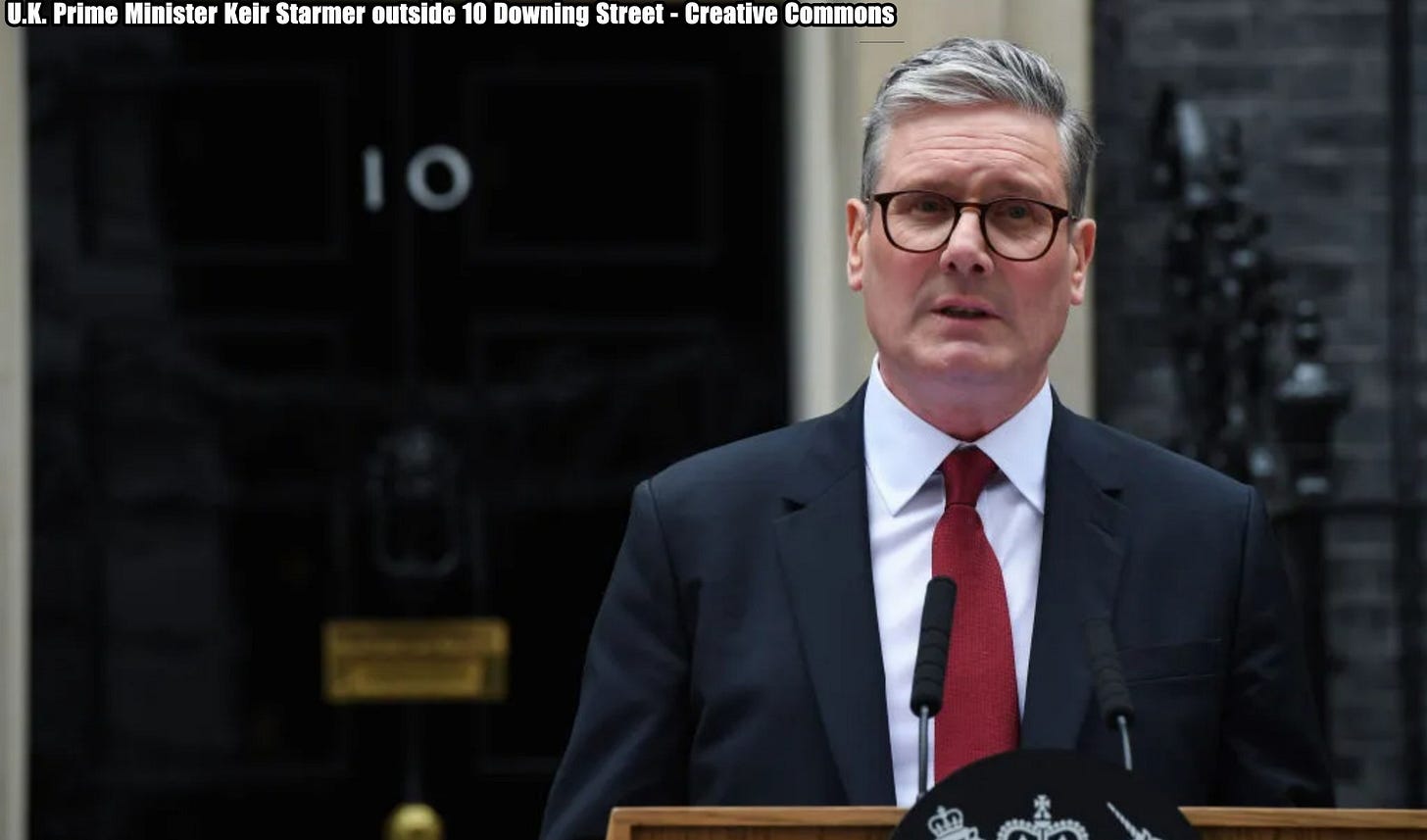Slava Ukraini! In early 2022 I began a Telegram channel aggregating news from a number of sources daily on the war in Ukraine. In June 2023 I began providing a daily draft for the Ukraine War Brief Podcast collecting news from over 70 sources daily, which formed the basis of the script. While the Podcast no longer exists I have continued to make this Brief available for my followers here on Substack for those who wish to keep up with the news from the war.
All the latest news on the Russo-Ukraine War 6 days per week
ALONG THE CONTACT LINE
GSAFU Morning Report
The General Staff of the Armed Forces of Ukraine in its Operational Information update at 08:00 on Feb 27 stated that Day 1100 of the full-scale invasion of the Russian Federation against Ukraine had begun.
The situation on the line of combat remains tense in some sectors. Ukrainian defenders continue to actively counteract the Russian aggressor, causing them significant losses in personnel, equipment and technology. Exhausting the enemy along the entire front line and continuing to disrupt the plans of Russian occupiers to advance deeper into the territory of Ukraine.
During the past day,110 combat engagements took place.
Over the past 24 hours, the enemy carried out 4 missile strikes, 81air strikes, used 2,557 drones and fired approximately 6,000 artillery shells across the positions of Ukrainian forces and civilians.
Air Force Daily Report
90 ENEMY UAVS SHOT DOWN, 72 DRONES FAILED TO REACH THEIR TARGETS (LOCATIONALLY LOST)
➖➖➖➖➖➖➖➖➖
On the night of Feb 27, 2025 (from 8:00 p.m. on Feb
26), the enemy attacked with 166 Shahed attack UAVs and simulator drones of various types from the directions: Orel, Bryansk, Millerovo, Shatalovo, Primorsko-Akhtarsk - Russia.
The air attack was repelled by aviation, anti-aircraft missile troops, electronic warfare units, and mobile fire groups of the Air Force and Defense Forces of Ukraine.
As of 09:00, the shooting down of 90 Shahed attack UAVs and drones of other types in Kharkiv, Poltava, Sumy, Kyiv, Chernihiv, Cherkasy, Vinnytsia, Khmelnytsia, Kirovohrad, Mykolaiv and Odessa regions has been confirmed.
72 enemy drone simulators were lost in location (without negative consequences).
As a result of the enemy attack, the Kyiv, Chernihiv, and Sumy regions suffered.
Combat Operations in the Kursk Sector, Russian Federation
The Institute for the Study of War (ISW), a US based think tank, in its Feb 26 Russian Offensive Campaign Assessment reported that Russian forces continued attacking in Kursk Oblast on Feb 26 but did not make any confirmed advances. Fighting continued northwest of Sudzha near Pogrebki, Orlovka, Novaya Sorochina, and Lebedevka; south of Sudzha near Guyevo and Kurilovka; and southeast of Sudzha near Makhnovka.
The Khortytsia operational-strategic group
(Responsible for the northeastern part of Ukraine. )
Kupyansk Sector: Russian forces recently advanced in the Kupyansk direction. Russian forces conducted offensive operations north of Kupyansk near Dvorichna, Radkivka, and Kindrashivka and east of Kupyansk near Petropavlivka on Feb 25 and 26. A Russian milblogger claimed on Feb 26 that Ukrainian forces counterattacked between Dvoricha and Zapadne (north of Kupyansk).
The Ukrainian General Staff published a map on Feb 26 indicating that Russian forces recently advanced along Soniachna Street in northern Dvorichna.
Chasiv Yar Sector: Russian forces recently advanced in the Chasiv Yar direction. Russian forces attacked near and within Chasiv Yar and south of Chasiv Yar toward Stupochky on Feb 25 and 26.
Geolocated footage published on Feb 26 indicates that Russian forces recently advanced along Horkoho Street in western Chasiv Yar.
Toretsk Sector: Ukrainian forces recently advanced in the Toretsk direction. Russian forces attacked near Toretsk and north of Toretsk near Krymske on Feb 25 and 26.
Geolocated footage published on Feb 26 indicates that Ukrainian forces recently advanced along Chaikovoskoho and Karla Libknekhta streets in northern Toretsk.
The Tavria operational-strategic group
(Responsible for the central-eastern and southeastern part of Ukraine.)
Pokrovsk Sector : Ukrainian forces recently advanced in the Pokrovsk direction. Russian forces conducted offensive operations northeast of Pokrovsk near Tarasivka and Vodyane Druhe; east of Pokrovsk near Novotoretske, Myrolyubivka, and Promin; southeast of Pokrovsk near Lysivka; south of Pokrovsk near Dachenske; and southwest of Pokrovsk near Zvirove, Leontovychi (formerly Pershe Travyna), Kotlyne, Udachne, Nadiivka, Uspenivka, Pishchane, Preobrazhenka, and Novooleksandrivka on Feb 25 and 26. A Russian source claimed that Ukrainian forces counterattacked near Novooleksandrivka, Kotlyne, Pishchane, and Udachne.
Geolocated footage published on February 26 indicates that Ukrainian forces recently advanced north of Pishchane.
Russia's advance slows down in critical areas after Ukraine regrouped, Syrskyi says.
Ukraine has regrouped its troops on the battlefield, slowing down Russian forces' advance in the most "threatening areas," The Kyiv Independent reported citing a statement by Commander-in-Chief Oleksandr Syrskyi on Feb. 27.
Russian troops are actively pushing on the Novopavlivka sector in eastern Donetsk Oblast, trying to break through Ukraine's defense and capture three settlements, according to Syrskyi.
"However, our side has taken a number of measures to improve the interaction of military units and subdivisions, regrouped troops, which slowed down... (Russia's) advance in most threatening areas," the general said after visiting the front line.
Since the beginning of the day, 110 clashes between Ukrainian and Russian forces have taken place along the front line, Ukraine's General Staff said in its latest update on Feb. 27.
According to Syrskyi, Russia continues trying to reach the administrative border of Donetsk Oblast, suffering heavy losses. "The plans remain unfulfilled," he said.
A day before, the 25th Separate Airborne Brigade reported that Ukrainian troops had regained control of the village of Kotlyne, near Pokrovsk. Kotlyne and Pokrovsk are connected by the T 0406 highway, which also leads to Dnipropetrovsk Oblast.
Kurakhove Sector: Russian forces recently advanced in the Kurakhove direction. Russian forces conducted offensive operations west of Kurakhove near Andriivka, Kostyantynopil, and Bahatyr and southwest of Kurakhove near Rozdolne and Rozlyv on Feb 25 and 26.
The Ukrainian General Staff published a map on Feb 26 indicating that Russian forces recently advanced to the T-0515 Pokrovsk-Andriivka highway northeast of Andriivka.
Geolocated footage published on February 25 shows Ukrainian forces striking a Russian-occupied building in western Andriivka, indicating that Russian forces recently seized the settlement.
Velyka Novosilka Sector: Russian forces recently advanced near Velyka Novosilka. Russian forces conducted offensive operations north of Velyka Novosilka near Novoocheretuvate, Skudne, and Dniproenerhiya and northwest of Velyka Novosilka near Burlatske on Feb 25 and 26.
The Ukrainian General Staff published a map on Feb 26 indicating that Russian forces advanced south of Novosilka (west of Velyka Novosilka).
Zaporizhia Sector: Russian forces recently advanced in western Zaporizhia Oblast. Russian forces conducted offensive operations northeast of Robotyne toward Charivne and northwest of Robotyne near Pyatykhatky, Mali Shcherbaky, and Kamyanske and toward Novoandriivka on Feb 25 and 26.
The Ukrainian General Staff published a map on February 26 indicating that Russian forces recently advanced south of Shcherbaky and northeast of Luhove (both northwest of Robotyne).
The Odesa operational-strategic group
(Responsible for Kherson, Qırım, (also known as Crimea) and the Black Sea.)
There have been no major changes to the combat environment since our last report.
TEMPORARILY OCCUPIED TERRITORIES
Nothing major to report.
THE HOME FRONT
More than 1.5 million liable for military service declared "limited fit" should undergo medical exam by Jun 5.
The Verkhovna Rada has extended the deadline for repeated medical examinations for more than 1.5 million people liable for military service until 5 June 2025, Censor.NET reported citing the General Staff of the Armed Forces of Ukraine.
"As of today, according to the Unified State Register of Conscripts, Persons Liable for Military Service and Reservists, the estimated number of persons liable for military service who are required to undergo a medical re-examination is more than 1.5 million," the statement said.
The General Staff emphasizes that the law establishes an obligation for citizens to independently apply to the territorial recruitment and social support centres, the relevant authorized bodies of the Security Service of Ukraine, the Foreign Intelligence Service of Ukraine, the intelligence agency of the Ministry of Defence of Ukraine, the central executive body implementing state policy in the field of state border protection, or through the electronic office of a conscript, person liable for military service and reservist, within the specified period of time, in order to receive a referral for passing the military medical commission.
On 12 February, the Verkhovna Rada of Ukraine passed a law extending the period for repeated medical examinations for Ukrainian citizens who have been declared "partially fit for military service" until 5 June 2025.
RUSSIAN WORLD
Putin orders to strengthen Russian border protection.
Russian dictator Vladimir Putin has ordered additional measures to protect the state border of the Russian Federation as 6 months after it began Ukraine still occupies part of Kursk.
Censor.NET reports he said this during a meeting of the board of the Federal Security Service of the Russian Federation.
"Serious additional measures must be taken to protect the state border. It is necessary to further increase the density of border coverage in potentially dangerous areas," the dictator said.
He also spoke of the need to ensure "the safety of the inhabitants of the border area."
"In cooperation with army units, Rosgvardia and Interior Ministry units, and local authorities, we must ensure the safety of people in border settlements, and we must fight extremism and terrorism resolutely and offensively," the dictator added.
Since August 6, 2024, the Ukrainian Defense Forces have been conducting an operation in the Kursk region of the Russian Federation.
Over the 6 months of fighting in this area, the Russians have lost about 39,000 people, including 16,100 killed.
During the operation, Ukrainian forces captured 909 Russian soldiers, significantly replenishing the exchange fund. This allowed hundreds of Ukrainian defenders who had been held in Russian prisons to return home.
‘You Can't Trust Putin’: Chechens, Georgians and Belarusians Fighting for Ukraine Warn.
Mikhael Dudadiev, 39, known by his war name Benor, is in the small kitchen of a Soviet-era apartment, preparing Zhizhig Galnash, a traditional Chechen dish made of meat, pasta and garlic sauce. The Moscow Times reports.
After weeks on the front lines, Benor is enjoying a brief moment of respite in the rear. He dips large chunks of boiled meat into the garlic sauce and eats them in hearty bites.
Next to him, one of his comrades, Vakha*, a Georgian, pours himself a glass of Coke. Benor is a veteran of the Second Chechen War. Vakha, who fought in the Georgian army, took part in his country’s 1993 war against Russian-backed Abkhaz separatists.
In the background, a radio is broadcasting the news: an American delegation led by Secretary of State Marco Rubio traveled to Riyadh and met with the Russian foreign minister.
The two men barely pay attention. They’ve heard it all before.
“I’m not interested in politics anymore. All I can say is that Russia will never honor its commitments. It never has. Not in Georgia, not in Chechnya, not in Ukraine after the annexation of Crimea. So why would it now?”
Benor dreams of spending his final days in his homeland. Born in Grozny, he joined the Chechen resistance during the Second Chechen War. He was barely 16.
In a dimly lit room, behind dusty-colored curtains, Adam*, known by his war name Berkhi, another Chechen fighter, focuses on his prayers. Drones and shells sit in a corner. On the couch, several rifles are piled haphazardly.
“We can never trust the Russians. I lost my country because of that so-called peace agreement (the Khasavyurt Accords). History is repeating itself. We won the First Chechen War. They took their time to rearm while dividing us, and in the end, they won. They will try to do the same thing with Ukraine. You can’t trust Putin. He’s a liar and a murderer,” Berkhi says in hesitant French. After living in Belgium, he joined the Ukrainian army in 2016.
Ukraine must be very careful, Benor insists.
“They will try to divide Ukraine, rebuild their army and resources — I’m 100% sure of it,” he continues. “That’s exactly what they did with Chechnya. They will use everything they have to take full control of Ukraine. They will never stop.”
INTERNATIONAL NEWS
Zelenskyy says US minerals deal success hinges on Trump talks.
President Volodymyr Zelenskyy said on Wednesday the success of Ukraine's minerals deal with Washington hinged on his looming talks with President Donald Trump, as the text of the agreement showed the Americans had offered no firm security guarantees, Reuters reports.
The deal is at the heart of Kyiv's push to win over Trump's support - including security guarantees - as the U.S. president strives to clinch a rapid end to the war with Russia that Kyiv fears could land a hammer blow to its national interests.
The Ukrainian government was poised to approve the text of the agreement later on Wednesday, so that it could be signed by both sides, the prime minister said, with Zelenskyy potentially visiting Washington this Friday for talks with the U.S. leader.
"This deal could be a great success or it could pass quietly. And the big success depends on our conversation with President Trump," Zelenskyy told a news conference.
Zelenskiy said both sides were still working on organising his potential visit on Friday to sign the deal after a tumultuous week in which the two leaders have exchanged hostile remarks, including Trump calling Zelenskyy a dictator.
The Ukrainian president said success would depend on the United States providing guarantees to protect the future security of Ukraine in the event of any Russian aggression after a peace deal is reached.
A copy of the agreement seen by Reuters on Wednesday and dated February 25 did not spell out concrete security guarantees under the deal, but mentions Kyiv's efforts to obtain them.
"The Government of the United States of America supports Ukraine's efforts to obtain security guarantees needed to establish lasting peace," it said.
Trump told reporters on Tuesday that Zelenskyy wanted to come to Washington on Friday to sign a "very big deal", after two sources with knowledge of the matter said the Ukrainian leader intended to visit that day.
Dozens of delegates walk out of Russia's speech to UN rights council.
Dozens of dignitaries walked out of Russia's speech to the U.N. Human Rights Council in Geneva on Wednesday in support of Ukraine.Reuters reports.
The delegates, including the ambassadors of France, Germany and Britain, gathered outside the room where the session was taking place to mark three years since Russia's full-scale invasion of Ukraine.
"Our support for Ukraine is ironclad. We want to see a just and enduring peace in line with the U.N. charter," Britain's Ambassador to the U.N. and World Trade Organization, Simon Manley, said.
"Ukraine has to be at the negotiating table," said Manley, who walked out of the speech as it started.
"If we let slide what happened with Ukraine without reacting...we would open the door to a disintegration of fundamental principles on which the U.N. was founded," France's Ambassador Jerome Bonnafont said.
Washington's seat at the Human Rights Council was empty after U.S. President Donald Trump's decision to quit the body, which is the only intergovernmental organisation that protects human rights.
In his speech to the council, Russia's Deputy Foreign Minister Sergey Vershinin accused Ukraine of a "flagrant violation of fundamental human rights", accusing it of Russophobia."Securing human rights and freedoms is incompatible with double standards," Vershinin added.
Ukraine's representative criticised Russia for defying international law.
"The aggressor should be punished, aggression should not be rewarded," Ukraine's Deputy Minister for Foreign Affairs, Mariana Betsa, told the council.
After her speech, she told Reuters there should be no bilateral talks with Russia.
"The EU should be present and the U.S. Nothing about Ukraine without Ukraine," she said, adding Ukraine needs clear security guarantees.
The U.N. Security Council on Monday adopted a U.S.-drafted resolution that takes a neutral stance on the conflict, reflecting Trump's upending of U.S. policy on Ukraine and his more conciliatory stance towards Russia.
Russia is demanding that Ukraine hand over several Ukrainian cities that in reality they have no prospect of occupying.
The Institute for the Study of War (ISW), a US based think tank, in its Feb 26 Russian Offensive Campaign Assessment reported that Russia is demanding that Ukraine surrender several large cities that Russian forces do not currently occupy and have no prospect of seizing, handing over one million Ukrainians over to Russia. Russia’s occupation of the remainder of the four Ukrainian oblasts would include large cities such as Kherson City (pre-war population of about 275,000), Kramatorsk (147,00 people), and Zaporizhzhia City (706,000 people) — all of which remain under Ukrainian control. The Russian occupation of such large population centers would significantly escalate the humanitarian catastrophe in Ukraine. Russian authorities would likely employ the same tactics of oppression, displacement, and forcible assimilation to Ukrainian civilians living in these areas as they have employed against the millions of Ukrainians who have been living under Russian occupation for over three years. Russian advances have recently stalled along the frontline, and Russian forces increasingly face unsustainable vehicle and personnel losses, indicating that Russian forces will likely be unable to occupy the full extent of these oblasts through military means in any short period of time if at all. Lavrov’s rhetoric is likely an attempt to achieve through negotiations what the Russian military cannot achieve by force. The Kremlin’s stated intent of seizing more of Ukraine's land and people directly contradicts US and European efforts to achieve a sustainable and lasting peace in Ukraine and reinforces Russia’s continued efforts to illegally occupy Ukrainian territory rather than to negotiate in good faith or offer concessions.
Starmer - US 'backstop' necessary to secure lasting peace in Ukraine.
U.K. Prime Minister Keir Starmer said on Feb. 26 that a U.S. "backstop" for a potential European peacekeeper contingent in Ukraine would be necessary to ensure a just and lasting peace, Reuters reported.
Starmer is heading to Washington to meet U.S. President Donald Trump and convince him to continue playing a role in Ukraine's security amid Russian aggression.
Recent weeks saw major geopolitical shifts as the Trump administration has adopted more antagonistic rhetoric toward Ukraine and other partners while intensifying diplomatic outreach to Russia in an effort to broker a swift agreement.
The U.S. president has avoided making any security commitments to Kyiv and made clear he expects Europe to take up responsibility for Ukraine's defense.
"I'm absolutely convinced that we need a lasting peace, not a ceasefire, and for that to happen, we need security guarantees," Starmer told journalists during his trip to Washington.
The Telegraph previously reported that Starmer aims to present Trump with a plan to deploy up to 30,000 European peacekeepers in Ukraine to monitor a ceasefire. While Trump has backed the idea of a European peacekeeping force, there is no consensus among European partners, and Moscow has rejected it outright.
The British prime minister reiterated that the U.K. is ready to take part in the mission but added that a U.S. "backstop" would be essential for such a plan, without elaborating on what concrete measures he expects from Washington.
Starmer's visit follows that of French President Emmanuel Macron, who also sought to convince Trump to remain engaged in Ukraine. Macron has reportedly failed to receive any clear commitments about a U.S. backstop, with an undisclosed EU official describing the trip as a "waste of time" in comments for Politico.
MILITARY & TECH
MiG-31K Sorties Frequency Plummets, causing some unfounded speculation.
Experts on social networks have recently argued that the Western sanctions against the Russian military-industrial complex had supposedly worked at such deep levels that now the Russians have no engines for the MiG-31 aircraft. This, they add, has resulted in the decreased activity of this aircraft lately, manifesting in much less air raid alerts across Ukraine. Defense Express reports.
However, after a long break, the Russian forces again took their MiG-31K, a special modification enabling Kinzhal aeroballistic missile launches, to the air on Feb 24, 2025. The contrast to earlier predictions spread anxiety throughout Ukraine, so Defense Express would like to clarify the nuances related to servicing MiG-31s and their engines.
Firstly, the fact that MiG-31Ks have resumed flights already suggests that problems with engine supply are not as dire as portrayed, mainly because the power plants can always be repaired through cannibalizing other engines for spare parts.
But if we delve deeper into the issue, the general picture is even less optimistic. In fact, the theory about MiG-31K engine problems stems from observations of decreased sortie frequency as of late: from Jan 1 Feb 26, 2025, only twice had the Ukrainian Air Force sounded the alarm due to MiG-31K activity, warning of a potential preparation for a Kinzhal missile strike. These instances dated Jan 8 and 25. The untypically low activity created the impression that the Russians have been experiencing technical troubles with the aircraft.
Open sources contain data that MiG-31 aircraft of all variants are equipped with D-30F6 jet engines, currently out of production. Interestingly, the D-30F6's mean time to repair is only 300 hours, meaning these engines need maintenance or repairs quite often. That was probably what led to the assumption that Russian MiG-31Ks are short on engine supplies, especially since Russian aerospace forces had used them so often throughout the war against Ukraine.
We should also note the following: back in 2014, representatives of the Russian military-industrial complex stated there were as many as 1,500 D-30F6 engines were stockpiled in warehouses, granting a stock enough to satisfy the demand for another 20 to 30 years without the need to manufacture new engines; followed by a declaration in May 2024 by the UDK-Perm Motors company of its readiness to resume production of the D-30F6 precisely because this reserve was running out.
However, there's an important nuance. In addition to the specially modified MiG-31K, the standard carriers of the Kinzhal missiles, Russia also operates MiG-31B/BM interceptor aircraft, which are an important asset for countering Ukrainian aviation at long ranges. Maintaining a fleet this large is certainly difficult for the Russian military industry.
While Russia only boasts 140 Mig 31s today it once had a fleet of 500, so it may still have many airframes to cannibalise.
That’s it for today’s Brief folks if you would like to keep up with events in Ukraine daily please consider subscribing, it’s free!


